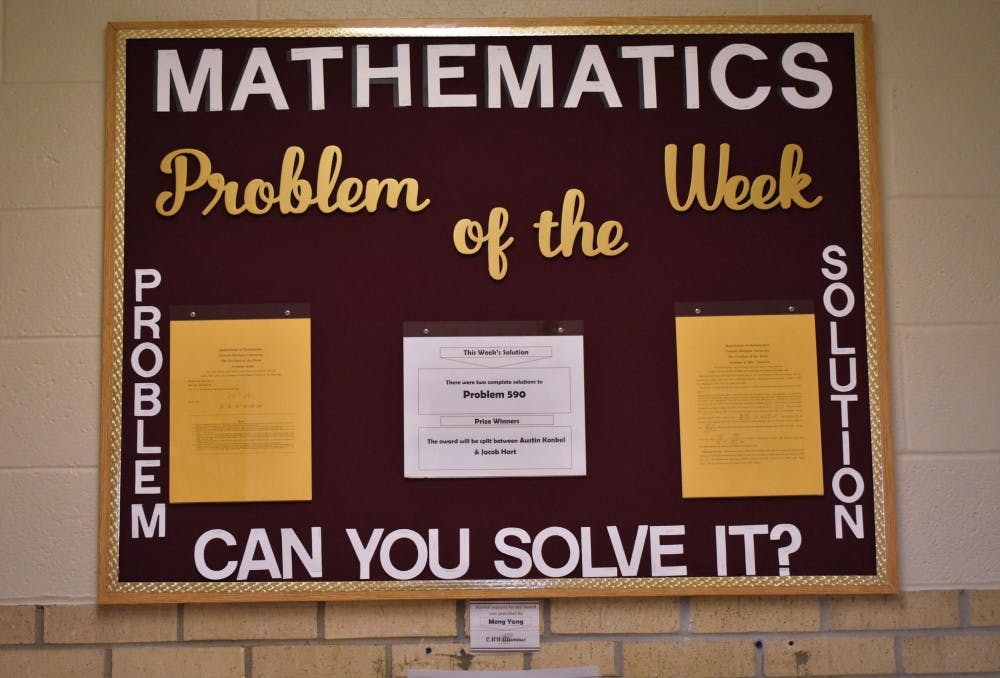"Problem of the Week" encourages students to practice math outside of class
Students can win prizes and earn extra credit by participating

A bulletin board showcases last week's winners and provides handouts for the latest problem of the week outside of mathematics department office on Sept. 21 in Pearce Hall.
For the past 10 years, the mathematics department has hosted “Problem of the Week,” a contest any student can enter by submitting their solution to a math problem.
Undergraduate students who submit correct answers are entered to win a $10 prize. Some math professors even offer extra credit in their class to those who partake in the weekly challenge.
The "problem of the week" is posted on a bulletin board in Pearce Hall and online each Monday.
Mathematics department faculty member Debraj Chakrabarti has selected each week’s problem for the last two years. The task was passed down like a torch, and now he takes time each week to get students involved in math outside of class. “It’s to make people interested in mathematics, especially undergraduates...and hone their problem-solving skills,” Chakrabarti said.
Chakrabarti has various ways of choosing problems. Each week, he chooses different subjects in math of varying difficulty. He keeps a stash of older problems that were used in prior years and alters the numbers, or randomly selects an equation from the stacks of math textbooks in his office. Occasionally, he will create the problems himself.
The number of participants varies, but it usually totals about one to four students each week. “It’s usually the same people, and they are usually always math majors,” Chakrabarti said.
Up to two people can win, given both are undergraduate students. If there are more than two correct solutions turned in, the winners are decided lottery-style, and the $10 is split between them. The winners on Sept. 10 were sophomores, Austin Konkel and Jacob Hart.
Konkel began to participate in the "problem of the week" last year. At first, he did it to receive extra credit in a class, but now he does it for himself. “I feel like it builds recognition for myself within the department,” Konkel said.
The time it takes him to complete the challenge varies from 30 minutes to two hours. Konkel’s method to approaching the problem is breaking it down over time. He’s found that sometimes taking a step back gives him new ideas, which he can test out later when he returns to the problem.
The challenge has forced Konkel to learn new theorems and principles. "I can tell my problem-solving skills have improved over the course of doing these," he said. For him, math provides the tools to think logically and to prove what is true. Although math may not be for everyone, he believes students who major in other subjects could still benefit from it.
Hart was always interested in math growing up. In his free time, he watches YouTube channels that focus on mathematics and problem solving. "Math is applicable to so many things," he said.
Like Konkel, Hart began to take part in the weekly challenge last year after a calculus professor encouraged his class to participate. Since then, he's been submitting an answer for about one third of the problems posted. "Even when I don't submit one, I look up the solution to learn from it," he said.
In addition to the "problem of the week," Hart finds other ways to challenge himself outside of class by participating in Integration Bee. The Integration Bee is a contest held by the American Mathematical Society each fall where contestants are given math problems to solve the fastest. Hart was the runner-up for the undergraduate category in 2017, and plans to participate again this year.
To some, the problem of the week may just be a way to earn money or some extra credit, but for Chakrabarti, it's not about either of those. "The prize itself is solving the problem," he said.



